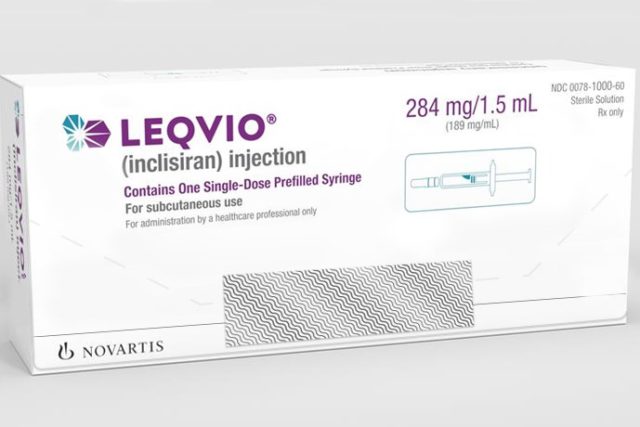
The FDA has approved a new cholesterol-lowering drug from Novartis that addresses the same target as two commercialized medicines from Amgen and Regeneron, but with a different approach and a key dosing advantage—just two injections per year.
The drug, inclisiran, is part of a relatively new class of genetic medicines that work by stopping production of a problem protein. In the case of the Novartis drug, which will be marketed under the name Leqvio, the target is PCSK9, a liver protein that in high amounts, impedes the body’s ability to clear low-density lipoprotein cholesterol, the “bad” form of cholesterol. Leqvio is comprised of small-interfering RNA that harnesses a cellular mechanism called RNA interference to stop a gene from producing PCSK9.
The way that Leqvio and other RNAi drugs work is sometimes referred to as gene silencing. It’s a different approach than PCSK9 inhibitors, the antibody drugs Repatha and Praluent from Amgen and Regeneron, respectively. Both of these drugs, given as subcutaneous injections every two weeks or monthly, were approved in 2015. However, their high price tags made them a tough sell to payers, and revenue fell short of initial expectations. In 2018, Amgen slashed Repatha’s price by nearly 60%, making the drug available at list price of $5,850 per year. Months later, Regeneron matched the pricing move for its PCSK9-blocking drug.
Approvals of the Amgen and Regeneron drugs cover heterozygous familial hypercholesterolemia, an inherited disorder that causes dangerously high cholesterol levels, potentially leading to heart disease, heart attacks, and strokes. Approval of Leqvio covers this same indication, but it also includes a much larger group: the roughly 30 million Americans who have a buildup of cholesterol in the arteries called clinical atherosclerotic cardiovascular disease. The Novartis drug is indicated for use alongside diet and statin therapy, a commonly prescribed class of cholesterol-lowering drugs.
Inclisiran, as Leqvio was initially known, came from the labs of Alnylam Pharmaceuticals, the Cambridge, Massachusetts-based biotech that won the first-ever FDA approval of an RNAi drug for Onpattro. Alnylam licensed inclisiran to The Medicines Company, which advanced it through Phase 3 testing. MedCo was preparing to file for FDA approval in 2019 when Novartis struck a deal to acquire the entire company for $9.7 billion.
The FDA review of Leqvio was based on results from three Phase 3 clinical trials enrolling 3,457 patients. Those results showed that at month 17, patients treated with Leqvio had cholesterol levels reduced by 52% compared to those given a placebo. Side effects such as injection site reactions, joint pain, urinary tract infection, and diarrhea, were comparable across both arms of the studies.
Treatment with Leqvio starts with an initial dose, then another dose at three months. The twice-yearly dosing schedule begins six months later. Novartis said this schedule may help patients who have trouble with self-administered medicines or with drugs that must be taken more frequently. Novartis set a $3,250 price for each dose of Leqvio. That means in a patient’s first year of treatment, three shots will cost $9,750. After that, the annual price will be $6,500.
The Institute for Clinical and Economic Review, a drug price watchdog, concluded in January of this year that evidence for the Novartis drug offers benefit over usual care, and it recommended a price in the range of $3,600 to $6,000 annually.
Leqvio’s approval comes one year after the FDA turned down Novartis’s drug application, citing manufacturing issues. Novartis said Leqvio will become available in early January.
Photo by Novartis








